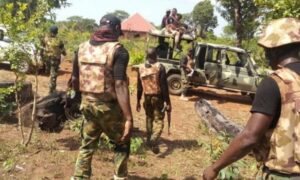The death toll from the Lassa fever outbreak in Nigeria has increased to 93, the Nigeria Centre for Disease Control (NCDC) has disclosed.
NCDC, in its weekly situation update, stated that 1,374 suspected cases and 93 deaths were reported across 21 states including FCT as of March 3.
In the reporting week 09 (February 25 to March 3), 39 new confirmed cases were reported from six states with eight new deaths: in Edo 5, Ondo 2 and Kogi 1.
There has been a spike in the number of new confirmed cases in this reporting week as compared to the last four consecutive weeks.
The reported spike is coming a week after the Director-General, NCDC, Chikwe Ihekweazu, said there has been a steady decline compared to the 2018 outbreak.
Mr Ihekweazu had said in the last four weeks there has been a consistent pattern with the number of confirmed cases and deaths reported across the country.
However, this week has one of the highest confirmed cases, he said.
Specifics
From January 1 to March 3, 1,374 suspected cases have been reported from states that have recorded at least one confirmed case.
Of these, 420 were confirmed positive, 15 probable and 939 negatives (not a case).
Overall, 33 states including FCT have reported 1447 suspected cases.
Since the onset of the 2019 outbreak, there have been 93 deaths in confirmed cases. This makes the case fatality ratio in confirmed cases to 22.1 per cent.
The 21 states which have recorded at least one confirmed case across 66 local government areas are: Edo, Ondo, Bauchi, Nasarawa, Ebonyi, Plateau, Taraba, FCT, Adamawa, Gombe, Kaduna, Kwara, Benue, Rivers, Kogi, Enugu, Imo, Delta, Oyo, Kebbi and Cross River.
‘No new infected health worker’
There is, however, no new case of infected health worker in the reporting week.
Since the onset of the outbreak, 15 healthcare workers have been infected in seven states- Edo (7), Ondo (3), Ebonyi (1), Enugu (1), Rivers (1), Bauchi (1) and Benue (1) with one death in Enugu.
The World Health Organisation has also pledged to intensify its response activities to the ongoing outbreak.
WHO said notwithstanding the overall decrease, available records indicate that several states have reported more cases in 2019 than in previous outbreaks.
As at February24, Bauchi, Gombe and Taraba have notably reported more cases (31, 26 and 03 cases respectively) than in 2018 during the worst Lassa fever outbreak to date.
WHO response
Speaking on the reduction in new cases, Clement Peter, the WHO Officer-in-Charge (OiC) for Nigeria welcomed the recent “evolution of the outbreak and the decrease in the number of new cases reported.”.
He said WHO continues to help affected states by strengthening their capacity to conduct disease surveillance, treat patients, implement infection prevention and control measures, laboratory diagnostics and engaging with communities?
“WHO has mobilised US$ 400,000 to support response activities and deployed experts to Nigeria and affected states to assist with coordination, active surveillance, case management, laboratory investigation, provision of supplies and research,” he said.
Backstory
Nigeria has been combating an outbreak of Lassa fever since the beginning of the year. This has become a yearly occurrence with hundreds of people infected and dozens of deaths recorded. At present, there is no known vaccine for the prevention of the disease.
The disease is often transmitted through rodent and human to human transmission.
In curtailing the spread of the disease, contact tracing has become very crucial.
About 4902 contacts have been identified from 19 states.
Of these, 1926 are currently being followed up, 2923 have completed the 21-day follow up, while four were lost to follow up. Eighty symptomatic contacts have been identified, of which 49 have tested positive
Currently, 69 patients are being managed at various treatment centres across the country: Irrua Specialist Teaching Hospital (ISTH) treatment centre -34; Federal Medical Centre Owo – 16; Federal Teaching Hospital Abakiliki – 2; Bauchi -2; Plateau 5; Taraba 7; Gombe 1, Kaduna 1 and Kebbi 1.
According to NCDC, the multi-sectoral one health national rapid response teams (from the NCDC, NFELTP, Federal Ministry of Agricultural and Federal Ministry of Environment) have been deployed to Ondo, Edo, Ebonyi and Taraba
Also, the National Lassa Fever Multi-Partner, Multi-Sectoral Emergency Operations Centre (EOC) continues to coordinate the response activities at all levels
You may be interested

Arsenal Equal Chelsea’s London Derby Feat After 5-1 Win Vs Palace
Webby - December 21, 2024Arsenal equaled Chelsea’s London derby achievement following their 5-1 win against Crystal Palace in Saturday’s Premier League game at Selhurst…

Haaland Backs Guardiola To Turn Man City’s Poor Form Around
Webby - December 21, 2024Erling Haaland had said he and his Manchester City teammates are still backing manager Pep Guardiola to turn the team’s…

PSG To Reignite Interest In Osimhen
Webby - December 21, 2024Paris Saint-Germain have contacted Napoli to discuss signing Victor Osimhen in January, according to reports in France.It is reported that…
























![American Pastor, David Wilson Seen Eating The Box Of Woman Who Isn’t His Wife [Video]](https://onlinenigeria.com/wp-content/uploads/2019/10/american-pastor-david-wilson-seen-eating-the-box-of-woman-who-isnt-his-wife-video-150x150.jpg)









Leave a Comment